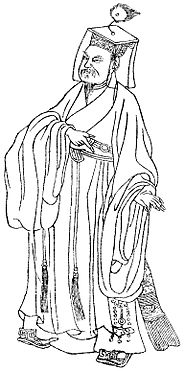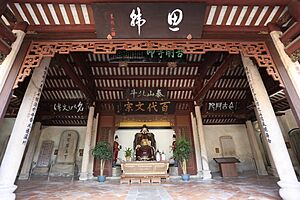Han Yu facts for kids
Quick facts for kids Han Yu |
|||||||||
|---|---|---|---|---|---|---|---|---|---|
 |
|||||||||
| Born | 768 Heyang (now Mengzhou, Henan) |
||||||||
| Died | 824 (aged 55–56) | ||||||||
|
|||||||||
| Occupation | Essayist, philosopher, poet, politician | ||||||||
| Han Yu | |||||||||||||||||||||||||
|---|---|---|---|---|---|---|---|---|---|---|---|---|---|---|---|---|---|---|---|---|---|---|---|---|---|
| Traditional Chinese | 韓愈 | ||||||||||||||||||||||||
| Simplified Chinese | 韩愈 | ||||||||||||||||||||||||
|
|||||||||||||||||||||||||
Han Yu (Chinese: 韓愈; 768 – 25 December 824) was a very important Chinese writer, thinker, poet, and politician. He lived during the Tang dynasty. His courtesy name was Tuizhi (Chinese: 退之), and he was also known as Han Wengong (韓文公).
Han Yu had a big impact on a philosophy called Neo-Confucianism. People say his influence on Chinese writing is like Dante, Shakespeare, or Goethe in Western literature. He believed in strong central government and traditional cultural values.
Many people think he was one of China's best writers of prose (regular writing, not poetry). A scholar from the Ming dynasty named Mao Kun even ranked him first among the "Eight Great Prose Masters of the Tang and Song".
Contents
Han Yu's Life Story
Han Yu was born in 768 in Heyang, which is now Mengzhou in Henan province. His family had a noble background. His father was a minor official but died when Han Yu was only two years old. After that, his older brother, Han Hui, raised him.
Han Yu loved to study philosophical writings and Confucian ideas. In 774, his family moved to Chang'an. However, they were sent away to Southern China in 777. This happened because they were connected to a minister who had lost his position.
His brother, Han Hui, died in 781 while working in Guangdong province. In 792, after trying four times, Han Yu finally passed the jinshi imperial examination. This was a very difficult test to become a government official.
In 796, he couldn't get a job in the government in the capital city. So, he worked for a military governor in Bianzhou until 799. Then he worked for another military governor in Xuzhou. He finally got his first job in the central government in 802. This was thanks to a recommendation from a military governor.
However, he was soon sent away again. This might have been because he didn't support the emperor's son, or because he criticized the emperor's servants. Another reason could be that he asked for lower taxes during a time of famine.
Important Government Roles
From 807 to 819, Han Yu held several government jobs. First, he worked in Luoyang, and then in Chang'an. During these years, he strongly believed that the central government should control all parts of the country. He wanted to bring back control over some areas in the northeast that had become too independent.
This period of his work ended when he wrote a very famous letter to Emperor Xianzong. It was called the Memorial on Bone-relics of the Buddha (諫迎佛骨表). In this letter, he strongly protested against the influence of Buddhism in China. The Emperor was very angry about Han Yu's criticism and ordered him to be executed.
Luckily, his friends at court saved him. Instead of being executed, he was sent away to Chaozhou. A few months later, Han Yu formally apologized to the Emperor. After that, he was moved to a province closer to the capital.
Emperor Xianzong died within a year. His successor, Emperor Muzong, brought Han Yu back to the capital. He worked in the War Office. Later, he got a high-ranking position after successfully convincing a rebellious military leader to rejoin the government.
Han Yu held other important government jobs, like being the head of the Imperial university. He died in Chang'an on December 25, 824, when he was 56 years old. He was buried in his family's cemetery in Heyang on April 21, 825.
Han Yu's Ideas and Beliefs
Han Yu was a very important Confucian thinker. Even though he isn't usually called a "philosopher," his ideas greatly influenced later Confucian thinkers. He also supported many writers around the year 800.
He led a movement against a fancy, decorative writing style called pianwen (駢文). He wanted writers to go back to a classical, simple, clear, and exact style. He called this style guwen (古文), meaning "ancient writing." He believed this classical style was perfect for bringing back Confucianism.
Views on Other Religions
Han Yu strongly supported Confucianism. He was also very much against Buddhism, which was popular at the Tang court. In 819, he wrote his famous letter, "Memorial on Bone-relics of the Buddha," to the emperor. In it, he criticized the state's plans to welcome a Buddha's finger bone. He called it a "filthy object" and said it should be destroyed.
Han Yu believed that Chinese civilization was different from "barbarian" cultures. He thought that people who followed Buddhism were like "birds and wild beasts or like the barbarians." He saw Buddhism as coming from outside China, so he felt it was not suitable for the Chinese people.
He also criticized Taoism, another Chinese belief system. He thought it was harmful to Chinese culture. However, he saw Taoism as a religion that came from China, unlike Buddhism, which was foreign.
In his essay "The Origin of Dao" (原道, Yuandao), he argued that the monastic life (like monks and nuns) in both Buddhism and Taoism was not good for the economy. He believed it caused social problems. He also said these beliefs couldn't solve society's issues.
Han Yu thought Confucianism was different because it connected a person's private moral life with the well-being of the state. He focused on Mencius's ideas for public morality and social order. His idea that Confucian spirituality should be shown through political actions later became a key part of Neo-Confucianism.
He also introduced the idea of the "succession of the Way" (道統, daotong). This meant that the true path of Confucianism was passed down through history. He also talked about the importance of a "teacher" (師, shi) who truly understood this Way. This was in his essay "Discourse on Teachers" (師說, Shishuo).
Even though Han Yu attacked Buddhism and Taoism, some of his own ideas were influenced by them. For example, the "succession of the Way" was inspired by the Buddhist idea of passing down dharma. His idea of the "teacher" came from Buddhist and Taoist ideas about religious mentors.
In "Discourse on Teachers," Han Yu talked about why it's important to learn from teachers. He criticized people at the time who felt it was shameful to learn from a teacher. He said, "A student doesn't have to be worse than the teacher, and the teacher doesn't have to be more virtuous than the student. The only difference is that one might understand the Dao (the Way) earlier or later, and each person might specialize in a certain area."
Han Yu's Writings
Prose Writing
Han Yu is often seen as the greatest master of classical prose during the Tang Dynasty. He was listed first among the "Eight Great Prose Masters of the Tang and Song." Along with Liu Zongyuan, he led the Classical Prose Movement. This movement aimed to bring back the simple, unadorned writing style of the Han Dynasty.
He believed that the classical "old style prose" (古文, guwen) was better for arguing points and expressing ideas. However, Han Yu's guwen wasn't just copying old writing. It was a new style based on old ideas of clarity, being brief, and being useful. Han Yu wrote in many different ways, often being very open and trying new things.
Some of his most famous essays are his strong arguments against Buddhism and Taoism, and his support for Confucianism. These include "Buddhism Memorial on Bone-relics of the Buddha" and "The Origin of Dao." Other well-known works include "Text for the Crocodiles" (祭鱷魚文), where he officially told crocodiles to leave Chaozhou. Another is "Goodbye to Penury" (送窮文), which describes his failed attempt to get rid of the "ghost of poverty."
Poetry Writing
Han Yu also wrote poetry. However, while his essays are highly praised, his poetry is not considered as amazing. According to a book called A History of Chinese Literature, Han Yu "wrote a lot of poems, often playful, on many different topics. He often turned everyday things into clever ideas."
The book also mentions a poem about his teeth falling out regularly. He used this to guess how much longer he might live. Overall, his poetry is not ranked as highly as his prose writings. The poem where Han Yu thought about getting old by losing his teeth is called "Losing Teeth" (落齒).
Why Han Yu Was Important
Han Yu is one of the most important people in traditional Chinese culture. His writings became classics in Chinese literature. They also changed the direction of writing itself. He was very creative with different writing styles. He had a huge impact on the literary and intellectual life of his time and for many dynasties after him.
His writings influenced writers and poets during the Song Dynasty. Especially Ouyang Xiu, who helped make guwen (the classical prose style Han Yu supported) very popular. This style remained the model for Chinese prose until modern times.
A famous Song Dynasty poet named Su Shi praised Han Yu in an inscription for a shrine. He wrote:
文起八代之衰,而道濟天下之溺;忠犯人主之怒,而勇奪三軍之帥。
His prose reversed the literary decline of eight dynasties, his teachings aided the misguided throughout the world, his loyalty led him to risk the wrath of his master, his courage surpassed the generals of three armies.—Su Shi, Inscription on Stele for Han Yu's Temple in Chaozhou
Everyone who wrote about Han Yu's life agreed that he was an open and honest person. He was always loyal to his friends. According to Li Ao, Han Yu was a great talker and an inspiring teacher. He taught his students tirelessly, wanting them to be perfect. But he also entertained them with jokes and poems, so they loved his teaching and didn't want to go home. The sense of humor in his writing was also a big part of his life.
Han Yu defended Confucianism when it was not as strong. He attacked both Buddhism and Taoism, which were very popular at the time. His writings had a big influence on later Neo-Confucians, like the Song dynasty scholars Cheng Yi and Zhu Xi. Even though he's not usually called a philosopher, he brought new ideas to Confucianism. However, some Song Confucians criticized him for being more focused on writing style than on moral lessons.
Most modern scholars agree that Han Yu has a secure place in Chinese literature. But they have sometimes found his strong Confucian beliefs a bit intense.
Memorials to Han Yu
In honor of Han Yu's contributions to Chaoshan when he was sent to Chaozhou, the Han River flowing through the city is named after him. The Han Yu Temple (韓文公祠) in Chaozhou was built during the Song dynasty by the Han River, on Mount Han, which is also named after him.
Because of his experiences dealing with crocodiles in South China, a type of extinct crocodile-like animal, Hanyusuchus, was named after him in 2022.
Descendants
Han Yu's descendants held the title of "Wujing boshi" (五經博士).
Images for kids
See also
 In Spanish: Han Yu para niños
In Spanish: Han Yu para niños
 | Misty Copeland |
 | Raven Wilkinson |
 | Debra Austin |
 | Aesha Ash |



